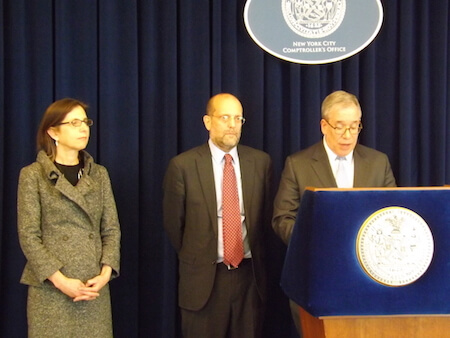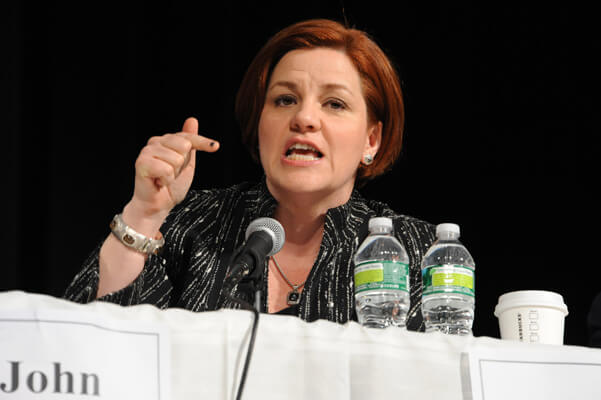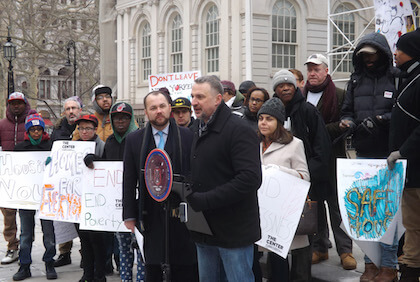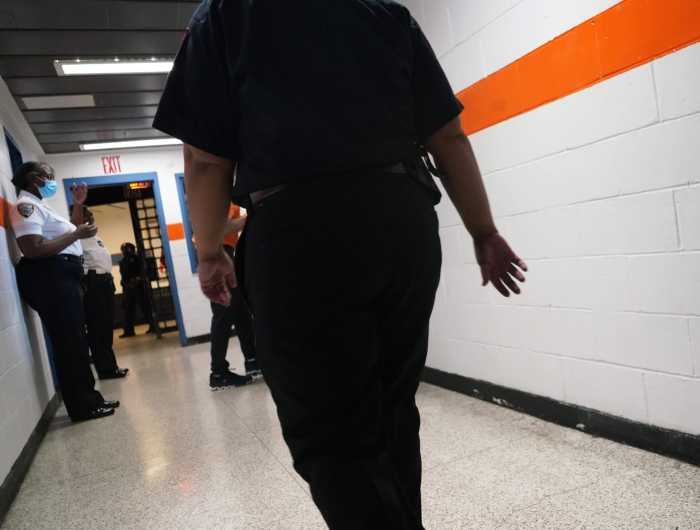Chris Quinn remains the frontrunner in the race for mayor, but she is not likely to be win the Democratic nomination flat out in the September 10 primary election. The City Council speaker’s leg up among her party’s field has been narrowing, but she had enjoyed such a large lead that this was not unexpected. The hope that she can get the 40 percent needed in the primary to avoid a runoff two weeks later is fading.
The current election maneuvering focuses on who might finish second and win the right to oppose Quinn in a one-on-one contest.
Anthony Weiner, should he decide to make the race, could end up helping Bill Thompson by siphoning votes from Bill de Blasio. Weiner, of course, is a smart politician and it is hard to say with certainty what his impact on the race will be. But his campaign will emphasize the middle class, which is often a code phrase for outer borough residents. The very people de Blasio is trying to attract in Brooklyn and Quinn is seeking in all boroughs.
Elections are unpredictable. The September 11 attack on the World Trade Center happened on primary day in 2001, forcing its cancellation, and the aftermath changed the outcome in November. Nobody could have predicted it. Who knows what will happen this year?
Public discussion of a potential Weiner candidacy will make his sexting an old and tired scandal by the time he announces. But it is unclear if antipathy among some women voters will persist or if the voters will ignore him because he is entering the race at such a late date. These are problems that political campaigns try and solve. Weiner enjoys remarkable support from his wife, Huma Abedin, who shows no hesitation about his returning to the political fray. Her close ties to Hillary Clinton — as a top aide dating back to her days in the US Senate — may spark rumors that Weiner is the Clinton candidate.
The media buzz surrounding Weiner notwithstanding, Quinn has a good shot at seizing the public’s attention over the next eight weeks. The City Council has received a budget from Mayor Michael Bloomberg, and its job, at the behest of the speaker, is to turn it into a workable document. Issues surrounding the NYPD’s controversial stop and frisk practices will also be at the fore. A Quinn measure to establish an inspector general for the police department and another bill barring racial profiling by the NYPD — which the speaker opposes — will both come up for votes.
To be sure, in the limelight, Quinn will be walking a high wire. Putting the final touches on the city budget is hard work, and shepherding measures regarding the police through the Council invites devastating headlines from the Daily News and the Post.
To her advantage, however, is the fact that such news headlines would also chip away at the notion that she is Bloomberg’s lap dog. They have disagreed sharply on the inspector general measure, the mayor arguing falsely that it would undermine the police commissioner’s authority. Inspectors general make recommendations to the heads of city departments, they don’t manage them. The mayor’s all-out assault on the IG proposal helps Quinn shed the narrative that she corruptly enabled Bloomberg’s third term.
Thompson can count on strong support in the black community, which is a major force in any Democratic primary. The former city comptroller supports stop and frisk — an unmistakable nod to anxieties in African-American communities about continued street crime — but he also makes a convincing case that had he been mayor (Thompson came surprisingly close to beating Bloomberg in 2009), the egregious racial profiling that has resulted would not have developed.
Quinn also belongs to the “mend it, don’t end it” school on stop and frisk, hence her support for an inspector general.
De Blasio, the city’s public advocate, is the candidate who has mounted the sharpest attacks on the mayor as well as the speaker for supporting the business community. Jarrett Murphy. the editor of City Limits, a policy wonk magazine for progressives, wrote in The Nation, “Public Advocate de Blasio has articulated the most cogent critique so far of the Bloomberg era, recently chastising the mayor for having ‘transferred more public value to the private sector in the past twelve years than at any time before in our history.’”
De Blasio hopes to build a coalition of Brooklynites and progressives citywide to winning the coveted number two spot on September 10.
The public advocate’s cause has certainly profited from a TV ad featuring a smoke-filled room that accuses Quinn of representing the one-percent. The speaker, meanwhile, has in recent months worked to build an alternate narrative, for example, endorsing a bill guaranteeing paid sick leave to private sector employees in the city. De Blasio and others criticized the move as too little, too late, but the speaker had an impressive array of labor leaders standing with her as she announced her new position. Stuart Appelbaum, the openly gay leader of the Retail, Wholesale and Department Store Union, has worked hard to organize that kind of support to demonstrate that Quinn retains vital progressive support.
Weiner would enter the mayor’s raise with sufficient money from his past campaigns to be taken seriously, but he has not participated in the debates nor explained why he is now looking to run. A September 24 runoff pitting Weiner against Quinn, however, would surely be New York politics at its most dramatic.
Quinn, should she prevail on the 10th or the 24th, continues to look good against Joe Lhota, the establishment candidate among those seeking the Republican nomination. Matched against the former MTA chair and Giuliani deputy mayor, Quinn would easily assume the progressive mantle, her appeal as a woman and a married lesbian compelling to many New Yorkers.


































